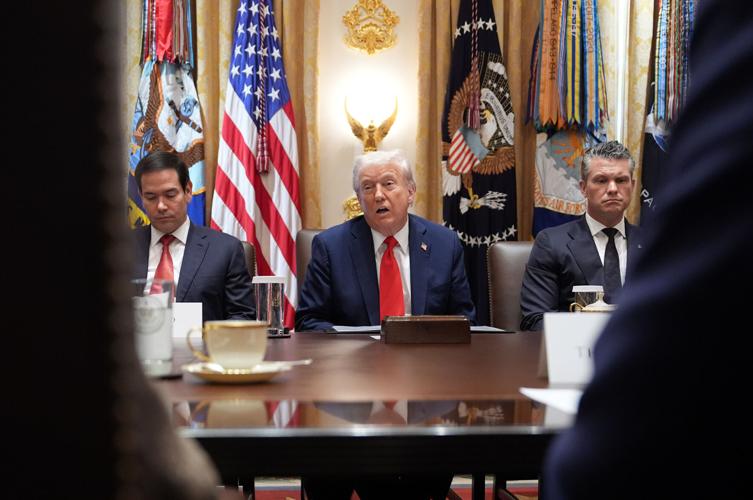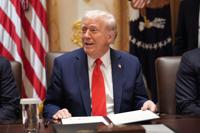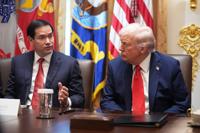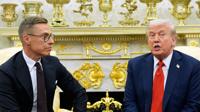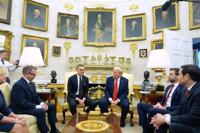WASHINGTON (AP) — Ever since Donald Trump returned to office, his attempts to make a name for himself as a historic peacemaker have been frustrated by the ceaseless Russian invasion of Ukraine and the persistent fighting between Israel and Hamas in Gaza.
Now Trump is on the brink of a remarkable breakthrough in one of those conflicts. He's forged a deal that could end the Middle East bloodshed that began just over two years ago with Hamas' deadly attack on Israel and cost the lives of tens of thousands of Palestinians.
If the pieces continue to fall into place — and that's far from certain in this combustible corner of the world — it would be a moment of vindication for a president derided by critics as a diplomatic bumbler more interested in personal prestige than international harmony.
Trump basked in his achievement on Thursday at a meeting with his Cabinet officials, saying it's “something that people said was never going to be done” and claiming the agreement could lead to an “everlasting peace.”
“Everything came together,” said Trump, who has long promoted himself as a master dealmaker dating back to his days as a New York real estate mogul.
The president plans to solidify the deal with a hastily planned trip to the Middle East over the weekend. He said he could participate in some kind of signing ceremony in Egypt, which has been a key player in negotiations, and speak to the Knesset in Israel.
There's still unfinished business in Gaza
As difficult as it was to reach this point, advancing the fragile effort to end the war will continue to test Trump's patience and focus. Israeli lawmakers still have to formally approve the plan. Then Hamas must release hostages that it kidnapped in its initial assault, while Israel has promised to turn over Palestinian prisoners. More challenges remain over providing humanitarian assistance in Gaza and assembling a transitional government there.
There's also no guarantee that the ceasefire becomes a turning point for the region, which is accustomed to brief interludes between fighting rather than durable coexistence.
“It is not a peace agreement,” said Aaron David Miller, who served as an adviser on Middle East issues to Democratic and Republican administrations over two decades. “It is not a guaranteed end to the war.”
However, he described the plan as a significant achievement and said, “something has happened here that breaks a two-year conflict and offers an alternative pathway.”
By happenstance, the Nobel Peace Prize is scheduled to be announced on Friday. Trump has explicitly campaigned for the honor, although he’s not expected to win.
Only three sitting U.S. presidents have received the Nobel Peace Prize — a fourth, Jimmy Carter, was recognized for his post-presidential work — and Trump would be an unusual choice in some ways. He's scoffed at multilateral institutions, bragged about bombing Iranian nuclear sites and pushed the limits of presidential power by striking alleged drug trafficking operations connected to Venezuela.
Trump appears to be girding himself for disappointment.
“Whatever they do is fine,” he told reporters. “I know this: I didn’t do it for that, I did it because I saved a lot of lives.”
Vice President JD Vance appealed to Trump's sense of grievance during Thursday's Cabinet meeting.
“For months, the fake news media attacked you, attacked the entire team, attacked your approach,” he said. Vance said, “the reason we’re here is because the president charted a different course.”
Trump had no experience in foreign policy before his first term as president, and he's been less willing than ever to heed the advice of experts in his second. His point person on negotiations was Steve Witkoff, a friend and fellow real estate developer, with an assist from Jared Kushner, the president's son-in-law.
Secretary of State Marco Rubio credited Trump's trip to the Middle East earlier this year, when he went to Saudi Arabia, Qatar and the United Arab Emirates, as well as conversations during the recent United Nations General Assembly.
Another key moment came during Israeli Prime Minister Benjamin Netanyahu's visit to the White House two weeks ago. Trump prodded him to apologize for Israel's airstrike on Hamas leaders in Qatar, a U.S. ally in the region that had been hosting ceasefire negotiations.
Then, Trump announced his plan to end the war in Gaza and gave Hamas a deadline to accept it. Although Hamas responded conditionally, Trump pushed forward anyway.
Trump gets praise and skepticism after deal is reached
On Thursday afternoon, Trump welcomed Finnish President Alexander Stubb to the Oval Office to finalize a deal on icebreaker ships that are crucial for operations in the Arctic.
Stubb is one of Trump's preferred European interlocutors, and he lavished praise on the Gaza agreement by saying, “this is what diplomacy is at its best.”
Foreign leaders widely acknowledged Trump’s role and expressed relief at the possibility of ending the war in Gaza, but they were also much more cautious after watching previous attempts unravel.
U.N. Secretary-General António Guterres issued a boilerplate statement, saying, “I welcome the announcement of an agreement to secure a ceasefire and the release of hostages in Gaza, based on the proposal put forward by President Donald Trump.”
French President Emanuel Macron praised Trump’s work on the deal and urged “all parties to strictly uphold its terms.”
Turkish President Tayyip Erdogan, who recently visited the White House, expressed his “sincere gratitude to U.S. President Donald Trump, who demonstrated the necessary political will to encourage the Israeli government toward the ceasefire.”
German Chancellor Friedrich Merz only referenced “the American president” and noted that “this is not really concluded.”
At Thursday's Cabinet meeting, Trump reiterated his claim that he's already “settled seven wars or major conflicts” since taking office, making the war in Gaza “number eight.”
And what about Russia and Ukraine?
“I think that's going to happen too,” he insisted.
Associated Press writer Laurie Kellman contributed to this report.






